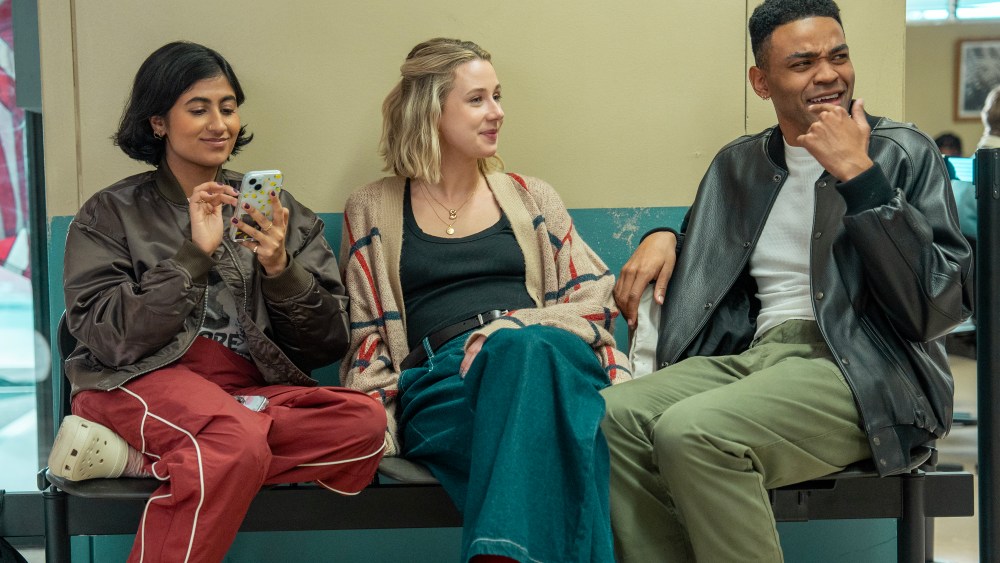FX Coming-of-Age Comedy Needs to Mature
If you can name a show about young people trying and struggling to establish themselves in a big city — “Friends,” “Girls,” “New Girl,” “Broad City,” “Insecure,” and “Happy Endings” all come to mind — then “Adults” needs no introduction. In fact, the FX sitcom, executive produced by comedian Nick Kroll, doesn’t bother making much of one. From the moment we see a clutch of twentysomethings on the New York City subway lamenting their “group smell,” we know exactly what we’re in for. Why would creators Rebecca Shaw and Ben Kronengold come up with an inciting incident with higher stakes than “a new roommate moves in” when the intended vibe is already so obvious? All a hangout comedy requires is people, well, hanging out.
But if “Adults” doesn’t need to do much to establish its premise, the series could certainly do more to distinguish itself within a crowded genre or define its own characters. In both the six episodes provided to critics and the attendant press, there’s a clear attempt to position “Adults” as a Gen Z answer to millennials’ “Girls” or Gen X’s “Friends” — a totemic piece of pop culture that older generations will look to as a youth translator and protagonists’ peers will look back on as a time capsule. Naturally, there’s a reference to Lena Dunham’s classic “voice of a generation” line in the pilot. Yet conjuring the spirit of that zeitgeist-capturing quote only emphasizes how “Adults” neglects to supply an equally potent distillation of overwhelmed, arrogant, hapless youth. I finished my screeners skeptical the next show to aim for that status will in turn reference “Adults.”
At the series’ start, housemates Samir (Malik Ellasal), Billie (Lucy Freyer), Issa (Amita Rao) and Anton (Owen Thiele) all live together in Samir’s childhood home, a single-family residence deep in Queens. That location, so far from the bustle and glamour of Manhattan, is itself somewhat interesting — except “Adults” makes almost nothing of its immediate environs, an incredibly diverse borough rarely depicted on screen, except the sight gag of 23-year-olds surrounded by fusty furniture and child-sized beds. Even the inconvenience of schlepping to the city or hipper neighborhoods goes largely unremarked upon. The absence of Samir’s parents is handwaved via world travel, and while it’s been the prerogative of every youth-based show since “Peanuts” to shove grown-ups to the side, the detail is one of many lost opportunities to flesh out just who these people are besides generically clueless.
Samir and Billie went to high school together, then gradually expanded their social circle through higher education, acquaintanceships, and in the case of Issa’s boyfriend Paul Baker (Jack Innanen), who’s exclusively addressed by his full name, romantic relationships. By the time “Adults” starts, however, this clique is an undifferentiated mass of post-collegiate confusion. Internal dynamics are mostly undefined; individual personalities are thinly sketched at best. Paul Baker is a pansexual himbo. Issa is outspokenly horny, with a cadence and bearing that owes a great deal to Ilana Glazer of “Broad City.” (If this was another art form, she’d be accused of biting Glazer’s flow.) Billie wants to be a journalist. Everyone nonetheless operates with the same level of ineptitude: mooning their job interviewers, referring to emptying the mailbox as a “weekend project” and vainly insisting they’re now “in the roast chicken phase of life.”
Such anxieties are certainly characteristic of one’s early 20s, but “Adults” never makes a convincing case for what’s unique about this cohort’s early 20s. In an interview with the New York Times, Kronenberg — who’s spent most of his 20s, along with Shaw, as a writer for Jimmy Fallon’s “The Tonight Show” after the couple’s Yale commencement speech went viral in 2018 — dubs Gen Z the “‘was that bad?” generation: “So much of our experience is turning to your friends to say, ‘Should I not have done that?’” Compared to more structural defining traits like a shared experience of the Great Recession or, more recently, the pandemic, it’s not much of a diagnosis to hang an entire show on.
To the extent “Adults” does capture its moment, it’s in form rather than content. Like so many freshman comedies in the streaming age, the first season just doesn’t have enough episodes to settle into a comfortable rhythm. Individual plots veer between cartoonish farce (the gang accidentally makes friends with a violent criminal) and more mundane problems (Billie loses her insurance and gets into medical debt). Over a longer duration, these extremes would likely even out into a consistent, and each character could grow into a more distinctive role within the ensemble. As “Adults” actually exists, though, it feels as uncertain as its subjects — and many of its TV contemporaries. In this sense, at least, it’s a show of its time.
In lieu of a more cultivated identity, “Adults” offers a slew of gimmicky bits that feel reverse-engineered to attain a life outside the show. The friends call “mind wipe” before they share an embarrassing truth they want the others to forget, and partake in a ritual called “house rules” where everyone is assigned a task, like getting a job or breaking a sexual dry spell, to complete within a week. But without the grounding ballast of a well-articulated sense of self, these jokes are free-floating concepts in search of the context that actually makes sitcom quips memorable. On “Adults,” the cart of demographic-representing relevance comes before the horse of developing a specific take on urban aimlessness. Would that becoming the defining portrayal of a time and place were as simple as declaring it so.
The first two episodes of “Adults” will premiere on FX at 9 p.m. ET on May 28, with the entire eight-episode season streaming on Hulu the next day.


